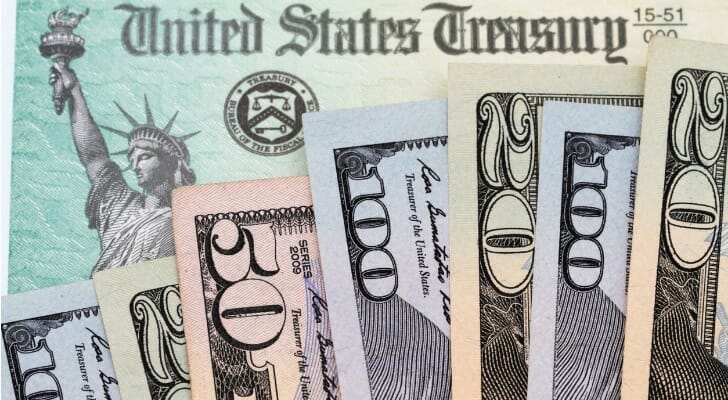Unclaimed money can come in the form of inactive financial accounts, unclaimed retirement assets and tax refunds, lost insurance policy benefits, and more. There’s more cash out there than you may think. In 2023 alone the National Association of Unclaimed Property Administrators (NAUPA) estimated more than $5 billion in unclaimed property was transferred back to owners 1 . Here are the details on some of the places you should look to find an unexpected payday.
A financial advisor can help you navigate unclaimed property recovery and figure out how it affects your tax liability and long-term goals.
What Is Unclaimed Money?
Unclaimed money generally refers to financial accounts that have been inactive or those you haven’t contacted in a year or more. Unclaimed property laws require these firms to turn over these unclaimed assets eventually.
So without even knowing it, you may have some cash sitting around waiting for you. Below are some common examples of unclaimed money:
- Old bank and savings accounts
- Certificates of deposit (CD)
- Stocks, bonds, mutual funds and dividends
- Trust funds
- Uncashed checks and wages
- Unclaimed tax returns
- Insurance policies
- Retirement plans
- Financial accounts with your name as a beneficiary
So what happens to these assets if you don’t take them? State laws require financial institutions and companies to transfer unclaimed money to the proper state authority within a certain time frame after it has been deemed unclaimed. That agency then attempts to find you and return your missing money.
Of course, you don’t have to wait for these institutions to find you. There are several legitimate resources you can use to track down your unclaimed money directly.
Unclaimed Money: Where Can I Find It?
The best place to start searching is MissingMoney.com. Most states and provinces responsible for tracking and returning unclaimed property endorse and work with this site. It supports a database where you can search for your missing money by state. So be sure to run a search for every state you’ve lived in.
You can also check with NAUPA. This organization represents the state treasury departments and agencies that hold onto unclaimed property. Both websites provide search engines, interactive maps and additional information about unclaimed money.
But sometimes, unclaimed property may not yet be in the hands of the state. In these cases, you’d have to go straight to the source. So let’s refresh your memory about some of the cash you may have forgotten about and where to look.
Unclaimed Money from The IRS and State Tax Departments
Uncle Sam may owe you a tax refund. In fact, the IRS takes back thousands of uncashed federal tax refunds each year. In some cases, the check never made it to the taxpayer because he or she moved and didn’t update the new address with the IRS.
And while it may not be the most fun thing to do with your spare time, you can contact the IRS directly to find out if you have any unclaimed tax refunds.
In addition, you can also file taxes for previous years if the IRS owes you a refund. However, you have up to three years to retrieve unclaimed tax refunds before they become the property of the U.S. Treasury 2 . So get your money as soon as possible before it goes back into the government’s hands.
The states that you’ve lived in may owe you a tax refund, so reach out to their tax departments online. The NAUPA database can also help you track down this unclaimed money.
Unclaimed Money in Retirement Plans
You’d think it’s impossible to forget about an asset as important as your retirement plan, especially one holding several thousand dollars. But it happens to people’s 401(k) plans, individual retirement accounts (IRAs), Roth IRAs and more.
Maybe you’ve jumped around from plenty of jobs and forgot about an old 401(k) with a small balance that is now quite large. Or your employer rolled it over to an IRA with another financial institution and you forgot all about it. You may even be the beneficiary of an inherited IRA or 401(k) and not even know it.
In those cases, you’ll want to claim your plan as soon as possible.
Remember, financial institutions that hold retirement plan assets are required to turn unclaimed money to state officials. In most cases, the state government liquidates these plans, taking them out of their tax-sheltered status. That may leave you open to hefty income taxes and IRS penalties when you try to get them back.
You can use the National Registry of Unclaimed Retirement Benefits to look up missing accounts 3 .
Unclaimed Money at Old Banks

If you’ve had an old account at a bank that had been permanently closed, your unclaimed money might be insured if the bank was a member of the Federal Deposit Insurance Corporation (FDIC).
But even small banks meet that designation. The FDIC covers deposits up to $250,000 per person, per institution and per account category. Deposit accounts include checking and savings accounts, money market accounts, and certificates of deposit (CDs).
Investments such as stocks and bonds aren’t covered by the FDIC. Individual retirement accounts (IRAs) aren’t covered either. However, the FDIC would cover a deposit account within an IRA. Some people invest their IRAs entirely in deposit accounts such as in an IRA CD. In this case, the FDIC covers it.
If you think you have some unclaimed money from closed banks, visit closed banks.fdic.gov. Just make sure you have your old checking account number ready.
Unclaimed Money at the National Credit Union Administration
The National Credit Union Administration (NCUA) insures up to $250,000 per individual depositor. This organization manages the National Credit Union Share Insurance Fund (NCUSIF). It’s backed by the full faith and credit of the U.S. government as is the FDIC Deposit Insurance Fund.
Unclaimed Money at the Pension Benefit Guaranty Corp.
If your pension plan shut down or got taken over by the Pension Benefit Guaranty Corp. (PBGC), this organization may owe you some or all of it. The PBGC runs a database that you can search to see if you have unclaimed pension plan money.
You can look for unclaimed pensions, insured plans and trusted plans.
Unclaimed Money at the Treasury Department
While securities are not FDIC insured, you may have unclaimed bond money sitting around. In fact, the Treasury Department holds records of billions of dollars in lost savings bonds that don’t collect interest any more. You can cash in now if you have one in your name.
So if you think you have unclaimed bond money, fill out Fiscal Service Form 1048 for more information. Unfortunately, the Treasury no longer runs the database for unclaimed bonds.
Unclaimed Life Insurance Benefits
Something as crucial as life insurance payouts can’t and shouldn’t go missing. But they do. You may have had one with an old company that demutualized. In this case, that firm may owe you cash or other assets. Unclaimed money from deceased relatives is another common occurrence, so there may be a life insurance policy with your name on it. If you want to search for missing life insurance money, you can start at demutualizing-claims.com.
Unclaimed Money at The Veterans Administration
Even after all you’ve sacrificed for your country, the Department of Veterans Affairs (VA) may still owe you unclaimed veterans insurance funds. If you think you have unclaimed money at the VA, you can run through the Unclaimed Funds database at the VA’s official website.
Unclaimed Money at the U.S. Department of Housing and Urban Development (HUD)
Several first-time homebuyers take advantage of the many federal programs offering low-interest mortgages to those who qualify. These include Federal Housing Administration (FHA) loans and those sponsored by the Department of Housing and Urban Development (HUD).
In such cases, the HUD may owe you a refund on part of your insurance premiums or even a share of the earnings. You can search the database at the HUD website to see if you have unclaimed benefits.
Unclaimed Money From The Claims Conference
Since 1951, the Conference on Jewish Material Claims Against Germany has striven to “provide a measure of justice for Jewish Holocaust victims, and to provide them with the best possible care.”
The conference works with Germany’s government to restore property that victims lost under Nazi Germany. It also works to collect payments. If you wish to seek assistance in this capacity, you can contact the Claims Conference directly by visiting claimscon.org.
Unclaimed Money Scams: How to Avoid
Unfortunately, financial scams happen everywhere. So remember that you can always find your missing money for free. You never have to pay someone else to do it for you.Some legitimate firms find your missing property and offer to return it in exchange for a fee that’s usually a percentage of your returned property’s value. Financial institutions may also hire these firms to locate you before they have to transfer your unclaimed money to state governments. However, in general, you should be wary of anyone who claims they found unclaimed property for you but wants you to pay for it first.
What Happens to Unclaimed Money?
The process by which unclaimed property holders transfer the assets to the state is known as escheatment. While each state has its own laws governing the due diligence guidelines and timeframes for handing over the money, they all go to the same place. Each state keeps the funds in a trust managed by their treasury departments. The money in this trust can be used by states to fund public projects; however, they don’t “spend” your money. If you have a rightful claim it will be paid in full.
How to Claim Your Money
Once you’ve located unclaimed funds, the next step is to officially claim what’s yours. While the exact process varies by state or agency, most follow a similar pattern. Here’s what you’ll need to do
1. Verify Ownership
Before releasing any funds, agencies require proof that you’re the rightful owner or beneficiary. Be ready to provide documentation that connects you to the unclaimed account or property. Common forms of verification include:
- A valid government-issued photo ID (driver’s license or passport)
- Proof of your current and past addresses (utility bills, lease agreements, or bank statements)
- Your Social Security number or the last four digits
- Supporting documents like pay stubs, account statements, or insurance paperwork if applicable
If you’re claiming funds on behalf of someone else, such as a deceased relative or a business, you’ll likely need to provide legal documentation (like a death certificate, will, or business registration).
2. Submit Your Claim
Most state websites allow you to file a claim online by completing a secure form and uploading supporting documents. If the agency requires physical copies, you can mail your paperwork to the address listed on the claim confirmation page. Be sure to follow the instructions precisely and keep copies of everything you send.
3. Wait for Processing and Track Your Claim
Processing times can vary from a few weeks to several months, depending on how complex the claim is and whether additional verification is required. Many state sites provide online tracking tools so you can monitor your claim’s progress. You’ll typically receive your funds by check or direct deposit once approved.
If your claim is delayed or denied, contact the agency directly for clarification, as sometimes a missing document or minor discrepancy can hold things up. Taking a few minutes to verify all details upfront can help you recover your unclaimed money faster.
How to Prevent Money From Getting Lost
Keep track of all your financials. The government essentially requires companies to turn your assets into missing money if they lose contact with you. So stay up-to-date on all your bank, investment and retirement accounts. Check the balance of each at least once every year. And keep the financial institution that holds your retirement funds updated with major life changes like marriage or divorce, as this could affect beneficiary status. In fact, you should keep every place you have money updated with your contact info.
And be sure to record account numbers, passwords and all other information you’d need to access your financials.
Bottom Line

A large sum of your unclaimed money may be resting in a government trust without your knowledge. Sometimes, the government will find you and give it back. But you can always track it down first. Start by searching the MissingMoney.com database, which is connected to the government agencies holding unclaimed property. Also check with the IRS for missing tax refunds. And contact previous employers, banks and other financial institutions for money you may not have cashed or held onto.
Tips on Retrieving Unclaimed Money
- Unclaimed money is everywhere, but it’s concentrated more heavily in certain places than others. Check out our study on the top states for unclaimed property. We also published one on the top counties for unclaimed property.
- If you don’t want to do all the dirty work yourself, a financial advisor can help you unearth virtually all your unclaimed money. Finding a qualified financial advisor doesn’t have to be hard. SmartAsset’s free tool matches you with financial advisors who serve your area, and you can interview your advisor matches at no cost to decide which one is right for you. If you’re ready to find an advisor who can help you achieve your financial goals, get started now.
Photo credit: ©iStock.com/asadykov, ©iStock.com/NoDerog, ©iStock.com/Deagreez
Article Sources
All articles are reviewed and updated by SmartAsset’s fact-checkers for accuracy. Visit our Editorial Policy for more details on our overall journalistic standards.
- https://unclaimed.org/
- “How to Find Unclaimed Money from the Government | USAGov.” USAGov Logo, 24 Sept. 2025, https://www.usa.gov/unclaimed-money.
- National Registry of Unclaimed Retirement Benefits, https://unclaimedretirementbenefits.com/. Accessed 30 Oct. 2025.
